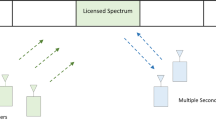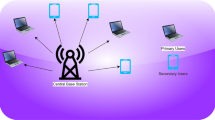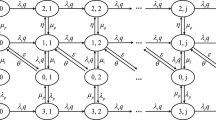Abstract
With the promise of improving the spectrum utilization of wireless devices, cognitive radio technology has gained a significant amount of interest from the research community. Particularly modeling the conflict between the primary users and the secondary users in case of dynamic spectrum access is a very important research problem in cognitive radio networks (CRNs). Many game-theoretic approaches have been proposed to achieve an optimal set of strategies for all the users and thus allocate resources efficiently to guarantee the satisfactory performance of the system. In this survey paper, we focus on the applications of the Stackelberg game to address the resource allocation problem in CRNs. We provide a comprehensive overview of some recent works on both the transmission power and spectrum allocation in cognitive radio systems. A wide range of network models has been explored including the ad-hoc CRNs, heterogeneous CRNs, etc. Finally, we discuss some of the present difficulties and open research problems to indicate potential trajectories of future work in this area.


Similar content being viewed by others
Availability of data and material
All data and material available.
References
Kolodzy, P. (2002). Spectrum policy task force, Federal Commun. Commission, Washington, DC, USA, Rep. 02–135.
Islam, M. H., Koh, C. L., Oh, S. W., Qing, X. , Lai, Y. Y., Wang, C., Liang, Y.-C., Toh, B. E., Chin, F., Tan, G. L., & Toh, W. (2008). Spectrum survey in Singapore: Occupancy measurements and analysis, Proc. 3rd Int. Conf. CROWNCOM, pp. 1–7.
Datla, D., Wyglinski, A. M., & Minden, G. J. (2009). A spectrum surveying framework for dynamic spectrum access networks. IEEE Transactions on Vehicular Technology, 58(8), 4158–4168.
Mitola, J., & Maguire, G. Q. (1999). Cognitive radios: Making software radios more personal. IEEE Personal Communications, 6(4), 13–18.
Mitola, J. (2000). Cognitive radio: An integrated agent architecture for software defined radio, PhD. diss., Royal Inst. Technol. (KTH), Stockholm, Sweden.
Haykin, S. (2005). Cognitive radio: Brain-empowered wireless communications. IEEE Journal on Selected Areas in Communications, 23(2), 201–220.
Menon, R., MacKenzie, A., Buehrer, R., & Reed, J. (2006). A game-theoretic framework for interference avoidance in ad hoc networks. In: Proceedings of the IEEE GLOBECOM 2006, San Francisco, CA, USA.
Xing, Y., Mathur, C., Haleem, M., Chandramouli, R., & Subbalakshmi, K. (2007). Dynamic spectrum access with QoS and interference temperature constraints. IEEE Transactions on Mobile Computing, 6(4), 423–433.
Niyato, D., & Hossain, E. (2008). Competitive pricing for spectrum sharing in cognitive radio networks: Dynamic game, inefficiency of nash equilibrium, and collusion. IEEE Journal on Selected Areas in Communications, 26(1), 192–202.
Wang, B., Liu, K. J. R., & Clancy, T. C. (2010). Evolutionary cooperative spectrum sensing game: How to collaborate? IEEE Transactions on Communications, 58(3), 890–900.
Beaulieu, N. C., Zhang, H., Jiang, C., Chu, X., Wang, X., & Quek, T. Q. (2015).Resource allocation for cognitive small cell networks: A cooperative bargaining game theoretic approach. IEEE Transactions on Wireless Communications, 14(6), 3481–3493.
Saad, W., Han, Z., Debbah, M., Hjorungnes, A., & Basar, T. (2009). Coalitional games for distributed collaborative spectrum sensing in cognitive radio networks. IEEE INFOCOM, pp 2114–2122.
Feng, X., et al. (2014). Cooperative spectrum sharing in cognitive radio networks: A distributed matching approach. IEEE Transactions on Communications, 62(8), 2651–2664.
Mochaourab, R., Holfeld, B., & Wirth, T. (2015). Distributed channel assignment in cognitive radio networks: Stable matching and walrasian equilibrium. IEEE Transactions on Wireless Communications, 14(7), 3924–3936.
Chowdhury, S., & Pan, J. (2017). Channel assignment in cognitive radio networks: A joint utility and stable matching approach. International Conference on Computer Communication and Networks (ICCCN), 2017, 1–9.
Wang, B., Wu, Y., & Liu, K. J. R. (2010). Game theory for cognitive radio networks: An overview. Computer Networks, 54(14), 2537–2561.
Razaviyayn, M., Morin, Y., & Luo, Z. (2010). A Stackelberg game approach to distributed spectrum management, 2010 IEEE International Conference on Acoustics, Speech and Signal Processing, Dallas, TX, pp. 3006–3009.
Wang, Z., Jiang, L., & He, C. (2014). Optimal price-based power control algorithm in cognitive radio networks. IEEE Transactions on Wireless Communications, 13(11), 5909–5920.
Zhao, F., Nie, H., & Chen, H. (Sept. 2016). Stackelberg game-based precoding and power allocation for spectrum auction in fractional frequency reuse cognitive cellular systems, EURASIP Journal on Wireless Communications and Networking, pp. 1–11.
Wu, Y., Zhang, T., & Tsang, D. H. K. (2011). Joint pricing and power allocation for dynamic spectrum access networks with Stackelberg game model. IEEE Transactions on Wireless Communications, 10(1), 12–19.
Ning, B., Sun, G., Li, J., Zhang, A., Hao, W., & Yang, S. (2020). Resource allocation in multi-user cognitive radio network with Stackelberg game. IEEE Access, 8, 58260–58270.
Zhang, N., Cheng, N., Lu, N., Zhou, H., Mark, J. W., & Shen, X. S. (2014). Risk-aware cooperative spectrum access for multi-channel cognitive radio networks. IEEE Journal on Selected Areas in Communications, 32(3), 516–527.
Zhang, T., Chen, W., & Yang, F. (2017). Balancing delay and energy efficiency in energy harvesting cognitive radio networks: A stochastic Stackelberg game approach. IEEE Transactions on Cognitive Communications and Networking, 3(2), 201–216.
Li, Q., & Xu, D. (2019). A Stackelberg game for cooperative cognitive wireless powered communication networks with multiple primary users. International Conference on Wireless Communications and Signal Processing (WCSP), 2019, 1–5.
Xie, R., Yu, F. R., & Ji, H. (2012). Spectrum sharing and resource allocation for energy-efficient heterogeneous cognitive radio networks with femtocells, 2012 IEEE International Conference on Communications (ICC), Ottawa, ON, pp. 1661–1665.
Xie, R., Yu, F. R., Ji, H., & Li, Y. (2012). Energy-efficient resource allocation for heterogeneous cognitive radio networks with femtocells. IEEE Transactions on Wireless Communications, 11(11), 3910–3920.
Rawat, D. B., Shetty, S., & Xin, C. (2016). Stackelberg-game-based dynamic spectrum access in heterogeneous wireless systems. IEEE Systems Journal, 10(4), 1494–1504.
Duan, L., Huang, J., & Shou, B. (2011). Investment and pricing with spectrum uncertainty: A cognitive operator’s perspective. IEEE Transactions on Mobile Computing, 10(11), 1590–1604.
Yang, L., Kim, H., Zhang, J., Chiang, M., & Tan, C. W. (2011). Pricing-based spectrum access control in cognitive radio networks with random access. 2011 Proceedings IEEE INFOCOM, Shanghai, pp. 2228–2236.
Yang, L., Kim, H., Zhang, J., Chiang, M., & Tan, C. W. (2013). Pricing-based decentralized spectrum access control in cognitive radio networks. IEEE/ACM Transactions on Networking, 21(2), 522–535.
Liu, X., Li, L., Liang, W., Yang, F., Xu, H., & Han, Z. (2018). Joint optimization scheme for spectrum leasing in cognitive radio nNetworks. International Conference on Wireless Communications and Signal Processing (WCSP), 2018, 1–6.
Zhao, X., Feng, L., Cheng, X., Li, W., Yu, P., Qiu, X., Wei, L., (2018). Spectrum allocation with differential pricing and admission in cognitive-radio-based neighborhood area network for smart grid, IEEE/IFIP Network Operations and Management Symposium (NOMS), 2018, pp. 1–7.
Yi, C., & Cai, J. (2014). Two-stage spectrum sharing with combinatorial auction and Stackelberg game in recall-based cognitive radio networks. IEEE Transactions on Communications, 62(11), 3740–3752.
Sun, S., Chen, N., Ran, T., Xiao, J., & Tian, T. (2016). A Stackelberg game spectrum sharing scheme in cognitive radio-based heterogeneous wireless sensor networks. Signal Processing, 126, 18–26.
Xu, L. (2018). Joint spectrum allocation and pricing for cognitive multi-homing networks. IEEE Transactions on Cognitive Communications and Networking, 4(3), 597–606.
Zou, J., Huang, L., Gao, X., & Xiong, H. (2019). Joint pricing and decision-making for heterogeneous user demand in cognitive radio networks. IEEE Transactions on Cybernetics, 49(11), 3873–3886.
Funding
No funding received.
Author information
Authors and Affiliations
Corresponding author
Ethics declarations
Conflict of interest
No conflict of interest.
Additional information
Publisher's Note
Springer Nature remains neutral with regard to jurisdictional claims in published maps and institutional affiliations.
Rights and permissions
About this article
Cite this article
Chowdhury, S. Resource Allocation in Cognitive Radio Networks Using Stackelberg Game: A Survey. Wireless Pers Commun 122, 807–824 (2022). https://doi.org/10.1007/s11277-021-08926-x
Accepted:
Published:
Issue Date:
DOI: https://doi.org/10.1007/s11277-021-08926-x




